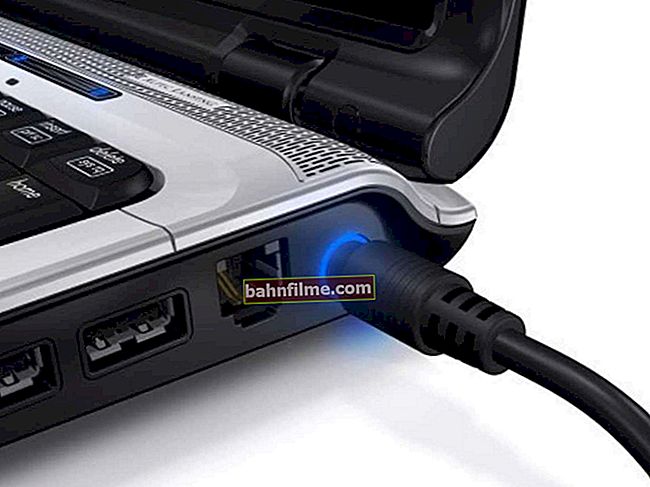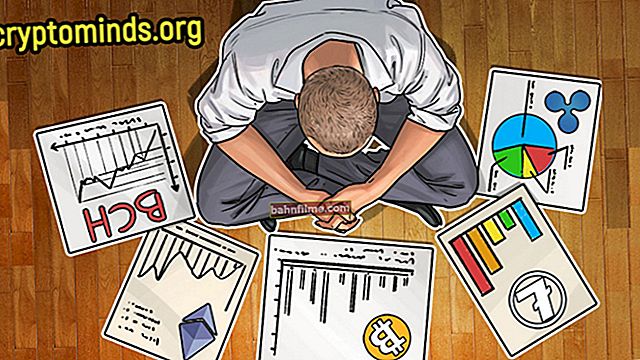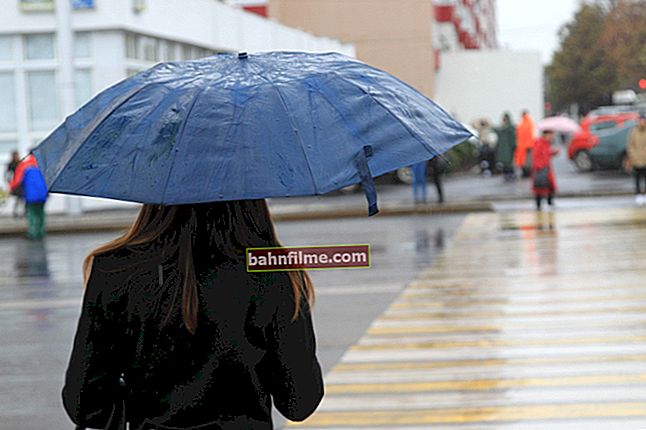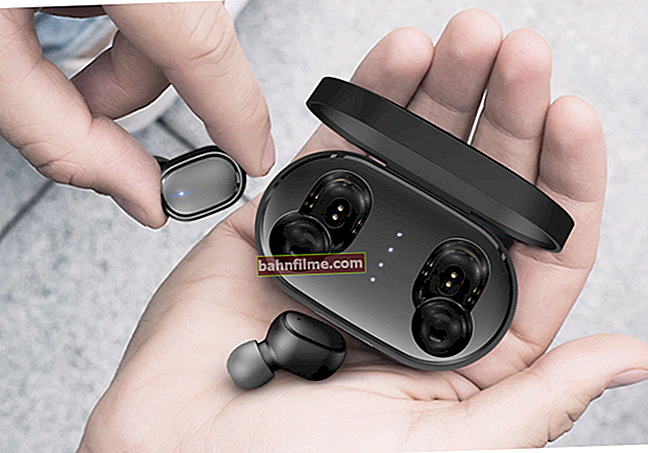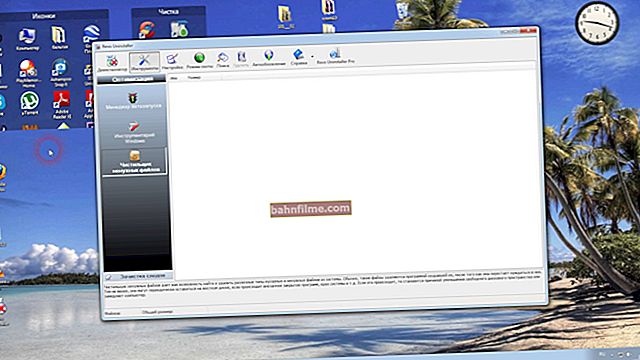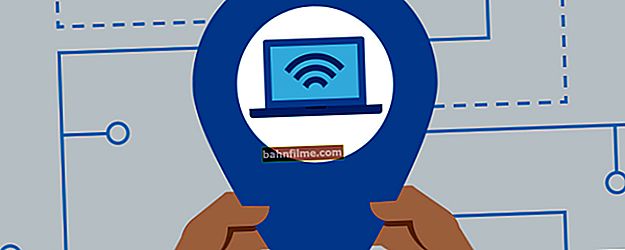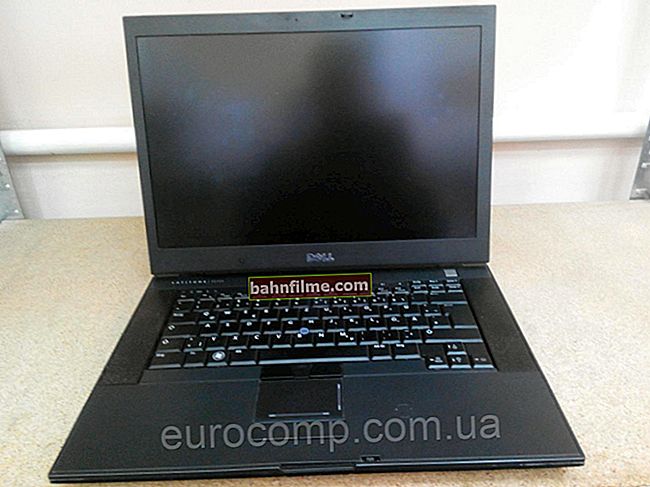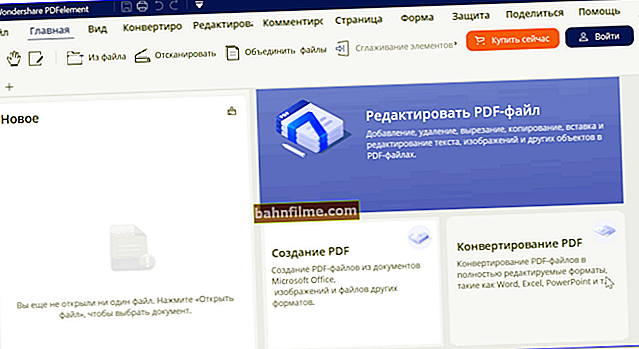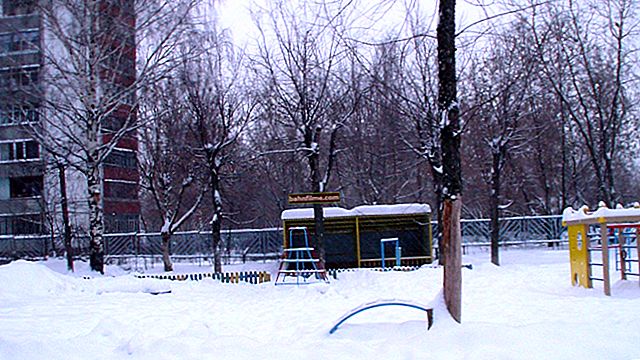
User question
Hello.
All of a sudden, my laptop began to slow down - the hard disk light on it does not stop burning. It slows down, can freeze for a long time, then revives for a few seconds, and then again. If you open any program or game at such a moment, then everything works very slowly, you can not wait for the opening ...
Formatted the HDD completely and reinstalled Windows - it didn't help (by the way, the installation took a very long time). I checked my computer with Dr.Web Cureit (+ Kaspersky) - it also did not help. Hard drive temperature 30-35 degrees.
Good day!
And more and more often I notice that someone replaced my hard drive ...
In fact, a slow hard drive is not so uncommon, and it is not always easy to make a "diagnosis". The reasons can be either hardware (for example, if the hard disk is damaged) or software (for example, the same uTorrent can load the disk with hashing). In the article I will try to indicate how to find and eliminate the cause (I will analyze the most popular of them). So...
*
Search for the causes of brakes and their elimination
❶ Analysis of HDD brakes
In some cases, you can almost accurately determine where to look for the cause of a slow disk. Therefore, the very first thing I want to start with is observation and analysis. Below I will give a number of questions, from which it will become clear where I am heading:
1) When the hard disk brakes, it makes a grinding noise, cracks, are there any knocks? Are there any suspicious sounds that weren't there before? (here I must warn you that many working hard drives emit a "slight" rattle. I'm talking here about those sounds that did not occur before during operation) ?
Sounds like these that appear may indicate a problem with the disc mechanics. In this case, the cheapest option is to replace the disk with a new one (how to choose a disk);
2) do you happen that files become "broken", do errors appear about the integrity of files when they are opened? How long does the process of copying and reading files take? How long does it take to boot Windows? Positive answers to these questions may indicate bad blocks. (you can try to cure it, more on that below) , on the fact that the disk was dropped (hit), on file system errors;
3) Have you tried to run Task Manager and see if there are any programs that "rape" your hard drive, loading it by 100% (for example, it can be uTorrent)? To call the task manager - press the keys Ctrl + Shift + Esc.

Task Manager - Disk Load 4%
It happens that the task manager shows the load at 50-100%, and the programs that do this are not displayed. In this case, try using a third-party monitor such as by Advanced SystemCare.

Performance monitor - what is loading the disk // Advanced SystemCare 10
4) how strong your brakes are: it's just a slight delay of 0.5 ÷ 1 sec. in the game, as it were, a short freeze (once every 15 ÷ 20 minutes), or they are so strong that you can't even start that very game - you wait for 3 ÷ 4 minutes. until it loads and the first menu appears? Simply, in the first case, it is often a matter of power supply settings, in the second, the range of problems is much wider;
5) was there an emergency shutdown of electricity? The fact is that after such a "sharp" shutdown of the PC (laptops are usually saved by the rechargeable battery), you need to run the utility chkdsk (more on this below), and check the disk for file system errors (which, by the way, is often done by Windows itself).
*
❷ Check disk for errors, bad blocks. SMART readings
Perhaps one of the main actions with which to start the fight against freezes and slow disk operation is to check if there are any file system errors on the disk (and if there are, then fix them), and whether it has begun to crumble - whether there are bad -blocks.
These topics are quite extensive and I will not analyze in detail in this article (fortunately, there is a separate instruction, here I will give a link to it).

How to check your hard drive for errors - //ocomp.info/proverit-hdd-na-oshibki-bed-bloki.html#i-2
How to check HDD for bad blocks - //ocomp.info/proverit-hdd-na-oshibki-bed-bloki.html#i-3
Mech validation is often neglected by many users. component of the disk, and meanwhile in vain. If the disc slows down very much, then I recommend that you check whether everything is in order with it. In many cases, the problem can be identified almost immediately as soon as the S.M.A.R.T. readings are viewed. (hard disk self-diagnostics system).
By the way, the testimony of S.M.A.R.T. can be found in more "simple" utilities than Victoria (which is discussed in the article on the links above). For example, in the same utility CrystalDiskInfo (I talked about it in this article - //ocomp.info/programmyi-dlya-rabotyi-s-hdd.html#i).
To find out S.M.A.R.T. and assess the condition of the disk - you just need to run the CrystalDiskInfo utility. Then, within a few seconds, the utility will independently evaluate your disk and deliver a verdict - an example in the screenshot below (both good and bad).

CrystalDiskInfo - disk analysis
*
❸ Drive power mode. Power supply
There are two points at this point. First - are the cables well and tightly inserted into the slots of the hard drive? It happens that the cables do not fit tightly, because of which the power supply of the hard drive may be unstable (this is not good).
And, the second point, in the power settings of your computer (most often laptops sin with this) - it can be set economical mode. Because of what, if the disk is not accessed for a while, it stops. But then, when you contact him, he needs time, and as a result, you have a slight freeze for 0.5 ÷ 1.5 seconds. This is especially noticeable in games, editors, and other applications.
1) So, first, open: Control Panel \ Hardware and Sound \ Power
2) Next, move the slider to "High performance" and click on the link "setting the power scheme" (example on the screenshot below).

High performance
Next, open the link "Change advanced power settings" (located at the bottom of the window).

Change advanced power settings
Then in the list add. options open the tab "Hard drive / Disconnect hard drive after" and expose your time. To prevent the hard drive from turning off at all, set the time - 0... After that, save the settings and restart your PC.

How long does it take to turn off the hard drive
Also, pay attention to one more point. Often laptop manufacturers put add-ons on their devices. software designed, for example, to save battery power. And by what means? Due to the brightness of the monitor, screen blanking timer, etc. Among other things, there are options that, in addition to Windows, help to stop the hard drive ...
In general, the message is simple - check if you have such manager programs and, at least for a while, try to set the performance in them to maximum .

Power supply - LENOVO laptop
*
❹ Disk operation mode - PIO / DMA. AHCI mode
If you have a rather old computer, then you may encounter the fact that Windows (due to some errors) transferred the hard disk from the operating mode DMA (allowing you to work directly with RAM) to the old PIO - because of which all actions are performed through the CPU. As a result, the speed of work drops and drops very significantly!
How can you find out in which mode the disk is operating:
- open the device manager (press Win + R, and enter "open" devmgmt.msc in the line);
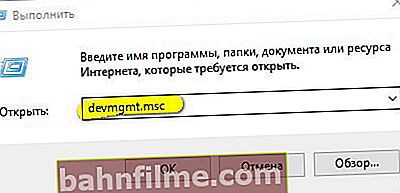
How to open the device manager
- select the item "IDE controllers ...";
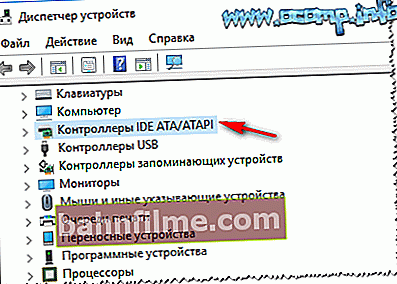
IDE controllers
- select primary or secondary channel;
- go to the "Advanced Options" tab.
- If the window shows the device operating mode PIO - transfer it to DMA.
- In some cases, to fix this problem, you must delete both IDE channels and restart the system. After restarting, Windows will select the optimal parameters and switch the disk to DMA.
Also, be sure to pay attention to another thing -Advanced Host Controller Interface - AHCI... If you have disabled this mode in the BIOS (and you could have turned it off, for example, when checking the disk, say, since some of the old utilities refuse to work in this mode), then the disk will slow down a lot.
To check if everything is in order - go to the BIOS, then, usually, you need to open the tab Configuration ... The links below are there to help you.
BIOS setup (in pictures) - //ocomp.info/nastroyka-bios-noutbuka-v-kartinkah.html#Configuration
How to enter BIOS - //ocomp.info/kak-voyti-v-bios.html

ACHI mode enabled || BIOS laptop
And one moment.
When installing Windows, it usually installs the SATA AHCI driver automatically (at least modern OS). In many cases, this is, of course, good, but in some cases, the disk behaves unstable. Here the message is simple - find out the manufacturer of the motherboard and download the SATA AHCI drivers from the official. site, and reinstall them!
To help! How to find out the characteristics of the PC (including the manufacturer of the motherboard) - //ocomp.info/harakteristiki-kompyutera.html
If you can't find the driver: You can use programs to auto-update drivers. I wrote about them here - //ocomp.info/update-drivers.html (I recommend Driver Booster - first on the list) .

Driver Booster - install SATA AHCI drivers
In some cases, you can try to update the drivers through device Manager : to do this, just open the tab "IDE ATA / ATAPI Controllers" , then right-click on "... SATA AHCI ...", in the context menu select "Update drivers ...", and follow the instructions of the wizard.

Device Manager - Update SATA ACHI Driver
Important!
For mat. boards on Intel chips - be sure to install the driver "The Intel (R) Rapid Storage Technology"... Usually it comes in a set on a disk for your laptop / PC (also available on the manufacturer's website). And it will also find it Driver booster (screen above).
*
❺ Hard disk temperature analysis
I also recommend that you pay attention to the temperature of the hard drive (especially if you have several of them, or it is hot in the room where the PC is located).
In general, the optimal temperature for a hard disk is considered to be about 30 ÷ 40 ° C. When the temperature goes beyond these limits, pay close attention to the cooling system (in general, many hard drives can work relatively quietly at 50 ° C (degrees Celsius), but their lifespan is significantly reduced!).
To help! HDD temperature: tell me what to do, HDD heats up to 49-54 ° C. How to reduce HDD temperature -//ocomp.info/temperatura-zhestkogo-diska.html
To find out the temperature of the HDD, use a utility to determine the characteristics of your computer. For example, I usually use CrystalDiskInfo, Aida64, Speccy (link to article with utilities below).
To help! Utilities for viewing PC characteristics - //ocomp.info/harakteristiki-kompyutera.html

Speccy - HDD temperature
How to lower the temperature:
- The first thing I recommend doing is dusting your computer. The fact is that over time, dust clogs the ventilation holes, ventilation deteriorates (hot air starts to come out worse from the device case) - as a result, the temperature rises ...
To help! Cleaning the computer from dust: monitor, system unit, keyboard - //ocomp.info/kak-pochistit-kompyuter-ot-pyili.html
- if you have a regular system unit - then you can put extra. cooler, or just open the lid of the system unit and direct an ordinary desktop fan towards the disk. Most often, this has to be done on hot summer days.
By the way, also pay attention: if your disks are too close to each other - if possible, set them further away (this is a tip for those who have 2, 3 or more disks).
- if you have a laptop - then you can buy specials. a stand that can lower the temperature by 5-10 ° C. True, some of them have one drawback - they make noise ...
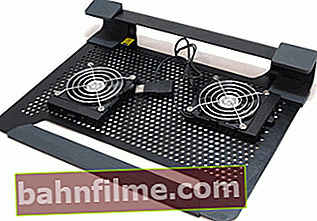
Notebook Stand
*
❻ Cleaning the hard drive from debris. Defragmentation
No matter how careful the user is - over time, a large amount of "garbage" accumulates on the hard disk: various temporary files, erroneous shortcuts, browser cache, "tails" from old remote programs and games, etc. All this affects the performance of Windows. From time to time this "good" must be cleaned.

You can find the best utilities for cleaning your computer in this article - //ocomp.info/programmyi-dlya-ochistki-musora.html

A guide to cleaning your computer / laptop to make it run faster - //ocomp.info/kak-pochistit-kompyuter-ot-musora.html
A few words about defragmentation (I explain it clumsily ...)
If, when opening files from a disk, your Windows behaves somehow slowly (note: slower than usual), then the reason for this may be fragmentation (the scatter of the "pieces" of your file on the disk, which all need to be assembled and read before the file is shown to you. The stronger the fragmentation, the higher the scatter, and the longer it takes to find all the "pieces")
Defragmentation Is the process of optimizing the storage of information on disk, necessary to ensure a continuous sequence of clusters (so that all the "pieces" of the file are in one place)... In general, if you deviate from the incomprehensible terms, then after defragmentation your disk starts to work faster: reading and writing files is accelerated. Thanks to this, your programs become more responsive, it becomes more pleasant to work on such a PC!
In details about defragmentation and programs for its implementation, here: //ocomp.info/programmyi-dlya-rabotyi-s-hdd.html#i-3
*
❼ Disabling Disc Indexing
The disk can be quite heavily loaded indexing (a special thing in new Windows that makes it easier to find files). In fact, a very small part of users constantly use file search, and therefore indexing, in principle, is unnecessary for them!
To turn it off: just go to "This computer" ("My computer") and go to the properties of the desired disk.

This Computer - Drive "D" Properties
Further in the tab "General" uncheck "Allow indexing of the contents of files on this disk in addition to the file properties" at the bottom of the window. Save your settings.

Disable disk indexing
Note: Windows has several system services that can start indexing as well. We are talking about Windows Search and Superfetch. The purpose of their work is to speed up the OS, but often it turns out the other way around ... If there is a problem with the HDD, I recommend trying to disable them. You can find out how this is done in this article: //ocomp.info/super-optimizatsiya-windows-10.html#i.
*
PS
Finally: if the above did not help, try installing another version of Windows (just not different collections - install a license), change / update drivers, check your OS for viruses. Perhaps this is too commonplace advice (which many people already follow before looking for advice on blogs and forums like mine), and nevertheless, in some cases, the reason lies precisely in them ...
Good luck!
👌




